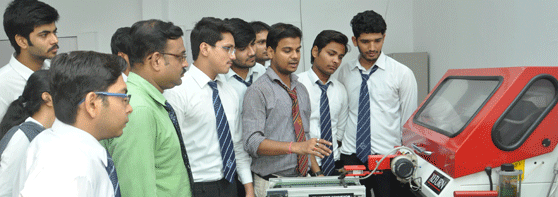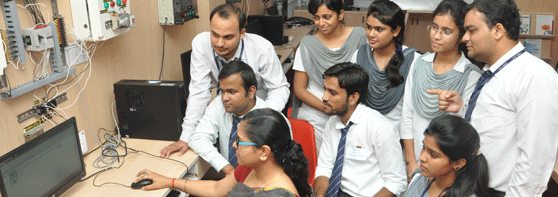
FMS LAB
The Computer Aided Machine (CAM) lab of the Mechanical Engineering Department was upgraded through addition of Flexible Manufacturing System with an investment of about forty lacs rupees.
FMS is an arrangement of machines (work-stations) interconnected by a transport system. The Automatic Guided Vehicle (AGV) carries work to the work station on pallets or other interface units so that work machine registration is accurate, rapid and automatic. A control computer controls both, machines & transport system. A Robot is used with the AGV to load and unload the machines.
Flexibility in machining means the ability to deal with slightly or greatly mixed parts, to allow variation in part assembly and variation in process sequence, change in production volume and change in design of certain product being manufactured.
The components of the FMS installed in the laboratory include two work-stations one of them CNC turning center and the other CNC drilling cum milling machine. Automatic storage and Retrieval system in another component in which materials are stored by the AGV after operations are over and can be retrieved from the place.
Automatic Guided Vehicle (AGV) provides movement to the raw and semi-finished/finished products in pre-programmed order to or from the work stations. Robot is also a component with AGVs and loading/unloading of machine.
Training to Students on FMS
The aim of this advanced laboratory is to enable the students to handle line production, in which they can program, simulate and run different parts for machining and get the experience of most modern line production systems. Such systems find the application in automobile parts machining and assembly units.

PLC LAB
The Automation Lab of Electrical and Electronics Engineering Department deals with the latest methods used for automation in industries. Most of the automation in industries is, currently, implemented through PLCs. A Programmable Logic Controller (PLC) is an industrial computer control system that continuously monitors the state of input devices and makes decisions based upon a custom program to control the state of output devices. PLCs are well adapted to a range of automation tasks. These are typically industrial processes in manufacturing where the cost of developing and maintaining the automation system is high relative to the total cost of the automation, and where changes to the system would be expected during its operational life. PLCs contain input and output devices compatible with industrial pilot devices and controls; little electrical design is required, and the design problem centers on expressing the desired sequence of operations. PLC applications are typically highly customized systems, so the cost of a packaged PLC is low compared to the cost of a specific custom-built controller design. On the other hand, in the case of mass-produced goods, customized control systems are economical. This is due to the lower cost of the components, which can be optimally chosen instead of a “generic” solution, and where the non-recurring engineering charges are spread over thousands or millions of units.
Almost any production line, machine function, or process can be greatly enhanced using this type of control system. However, the biggest benefit in using a PLC is the ability to change and replicate the operation or process while collecting and communicating vital information. Another advantage of a PLC system is that it is modular. That is, you can mix and match the types of Input and Output devices to best suit your application.
The components available in the laboratory include Relays & Contactors, Sensors (Photoelectric, Proximity), Controllers (Timer, Counter, Temp. Controller), Drives (VFD, Star –Delta starter, Latching, Inching), Programmable Logic Controllers (IDEC make)and HMI (Human Machine Interface).
Training to Students on PLC and HMI
The aim of this advanced laboratory is to enable the students to make them proficient in PLC programming and get the experience of most modern control system used in production and process industries.



